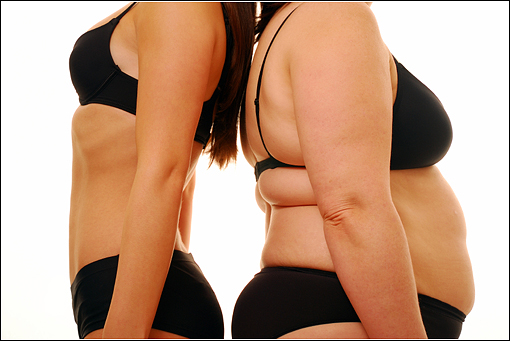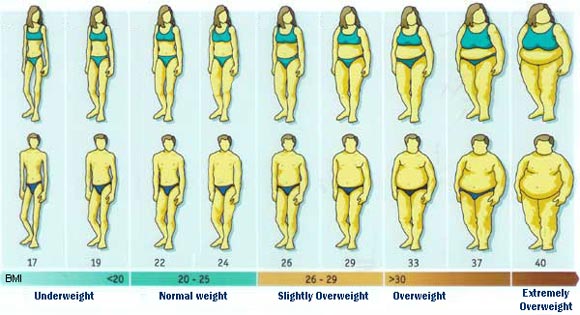
Health media and bloggers are a-buzz over a recent study by Flegal and colleagues of the National Center for Health Statistics at the CDC. The study analysed data published in other papers in an effort to build a comprehensive dataset and determine whether BMI corresponds with mortality. In short, the broad analysis revealed that (not surprisingly) morbid obesity is associated with significantly higher likelihood of death; however, the study also found that the “overweight” BMI category is associated with a significantly lower (~6%) risk of death relative to “normal weight” individuals.
With this single statement in the study’s abstract, the primary investigators stirred a massive controversy. Obesity researchers have called this study “rubbish” while self-identified fat activists have taken to CNN to proclaim this paper a definitive blow to institutionalized fat bias.
Before I dive into this controversy, let me first remind us of a few things. The Flegal study used the BMI — or “Body Mass Index” scale — to categorize subjects based on their body weight. BMI is calculated from a person’s height and weight to generate a number that typically falls between 18 and 40; that number then allows you to plot your index against a table that let’s you classify yourself as “normal weight”, “overweight” or “obese”.

Now, there’s a simple explanation for the findings of the Flegal study — the BMI scale is deeply flawed. The BMI scale is, in fact, a horrible tool for predicting an individual’s fitness or health status. The Flegal study is simply pointing out how the BMI scale is both over-used and incorrectly interpreted by primary physicians.
BMI was first created as an epidemiological and clinical tool that allows for rapid screening of a patient’s weight status, as a first-step indicator of whether or not a person may be at higher risk for obesity-related diseases. It’s strength was that the input data — height and weight — could be collected with a simple scale and tape measure, and you could arm patients with BMI as a way of monitoring their own fitness level at home. Further, the reason for its existence is that en masse, high BMI correlates with a host of chronic diseases you really don’t want.
The problem is that in the non-scientific world, the correlative nature of the BMI scale has been confused with causation. While scientists still understand how BMI is (and is not) correlated with poor health and morbidity, doctors and the average citizen puts too much emphasis on BMI, mistaking the fact that having a high BMI means one may be at risk of also having other obesity-related diseases with the misguided notion that having a high BMI will cause those obesity-related diseases.
On an individual level, your BMI is relatively meaningless, precisely because BMI doesn’t directly test the actual health factors that lead to the development of chronic disease — blood pressure, diet, body fat percentage, and lifestyle choices. The BMI scale fails to consider variations in people’s body compositions (by definition, it assumes everyone’s muscle mass, bone mass, and hydration level are the same) in order to produce a rough guesstimate of whether or not a person might be obese or not.

Given these considerations, it’s not surprising that the Flegal study found that folks who fall into the “overweight” category of the BMI scale might have (en masse) a slightly lower risk of death than “normal weight” individuals: “overweight” individuals will include a large proportion of bonafide “slightly overweight” folks, but this group will also include a “contaminant population” of strength training athletes, people who have better access to food because of better socioeconomic status, folks who may eat a more varied nutrient-dense diet, and perhaps even younger individuals (who tend to have more muscle mass). The Flegal study did not — actually could not — tease these confounding factors out.
The bottom line is this: it is quite possible to be a healthy individual and to appear “fat” on the BMI scale. However, it’s also clear that folks who are both fit and fat typically have unusual body composition and weight distribution and/or have spent at least some of their daily energy focusing on maintaining a fit and active lifestyle that result in better heart health, good nutrition, and high muscle mass; even if they still carry a few extra pounds of fat. You can be fit and fat, but it is not the default.
What troubles me in this debate is, in fact, the opposite end of the spectrum, personified by self-identified fat activist Marilyn Wann is equally as alarming as the popular misconceptions about the BMI scale. Wann write in an editorial on CNN:
After a careful review of all relevant research worldwide, the U.S. government’s leading analyst of weight data just confirmed what I’ve long known: Being fat might not be a death sentence.
That this study reported in the Journal of the American Medical Association seems at all shocking is a measure of the intensity and pervasiveness of weight prejudice in our society and in our sciences.
In short, Wann weighs the (questionable) findings of this single JAMA article against an entire body of obesity research literature, and finds the thousands of published papers showing a clear connection between obesity and poor overall health to be lacking; worse yet, she lobs a veiled accusation against the scientific community of, in essence, falsifying data based on internalized “weight prejudice”.
This is, in every facet, equivalent to climate change denialists touting the findings of a single, potentially flawed, study with “favourable” findings against reams of evidence that support global warming.
Despite the headline of her article — “You Can be Fit and Fat” — Wann fails to make a single compelling argument that in favour of her overall thesis that obese individuals are just as healthy as non-obese individuals. Instead, she spends the bulk of her piece in CNN speaking about weight prejudice and fat tolerance, telling anecdotal tales of individuals whose primary health advice from medical professionals is to lose weight. Wann goes so far as to suggest that obesity is not, itself, a risk factor for disease, but rather that fat individuals have poorer health because hospitals aren’t equipped with blood pressure cuffs that fit around larger arms:
One woman called in the middle of the night, hoping I knew of an MRI she could use for an important test. The machine at her local hospital, which she’d used before, was being guarded by a technician who strictly enforced the weight limits. The tray that slides in and out of the machine could break. Instead, she was denied potentially life-saving information in a crisis. How many of the deaths blamed on weight are actually caused by medical equipment — everything from blood pressure cuffs to surgical instruments — that fails to accommodate fat people when we need it most?
I’ll never forget the teenage girl who was told by a nurse practitioner that her complaint would go away once she lost weight. Luckily, she had the nerve and the parental backup to get another appointment and the prescription necessary to treat her condition. How many of the deaths blamed on fat actually happen when people are diagnosed as fat instead of being diagnosed and treated for an illness?
Wann’s argument is that obesity is not, in any way, related to fitness. She notes a study that showed that age, not obesity, was the primary cause of death in patients over the age of 65; she forgets that obesity tends to cause early death before the age of 65, and that cardiovascular disease (which arises in part from obesity) is the leading cause of death in America.
Let’s be absolutely clear. Obesity is strongly associated with metabolic disorders (with the latter likely causative of the former). Metabolic disorder is likely the principal cause of cardiovascular disease. Fat individuals are dying because — without being too hyperbolic — obesity kills.

Here’s the thing: Wann is completely on the mark when it comes to wanting to fight against fat intolerance. Obese individuals should not be targets of society’s derision and ridicule. Obese individuals need access to adequate healthcare, insurance, and resources for healthy weight loss. Obese individuals shouldn’t be made to feel shame or self-hatred for their obesity, or to be associated with such negative terms as “lazy”, “unintelligent” or “ugly”. This is about as productive, and as charming, as throwing rocks at the fat kid in the playground until he breaks down and cries. It’s bullying, plain and simple, and it’s nothing I want to be teaching my kids.
But, isn’t it demeaning, patronizing, or — dare I say it — even intolerant to advocate that obese individuals should be treated to a selective interpretation of the science because they don’t deserve to hear the truth that obesity is, demonstrably, a risk factor for one’s health? Doesn’t is suggest that obese individuals can’t, or shouldn’t be, given all the facts about their own medical status because their self-esteem can’t handle it? Doesn’t it imply that we should lie to obese individuals because it’s mean to suggest they need to lose weight? And, when the consequences of these lies is a proven reduction in lifespan and overall quality of life for obese patients, aren’t we at risk of institutionalizing a form of fat oppression by way of deliberately limiting an obese person’s health outcome?
Obese individuals can be smart, beautiful, competent people. But, obesity is also the single greatest health epidemic facing America today, with a full 30% of children now being classified as overweight, and with some developing type II diabetes (traditionally an adult onset disease) as young as age 10.
I get that the fat acceptance movement comes from a place of wanting to encouraging healthier relationships between people and their own bodies. But, the movement against weight bias should be about addressing the institutional bigotry against fat people that aims to shame obese individuals into losing weight, rather than supporting them in that process. The movement against weight bias should be highlighting the mental health and self-esteem issues that obese children face when they are ridiculed by classmates and teachers, instead of offered in-school training and access to proper nutrition. The movement against weight bias should be working hand-in-hand with federal health initiatives that are promoting better eating and more activity by promoting the message that obese individuals should lose weight because they love their bodies, not because they hate them.
Instead, the movement takes a step backward, in my mind, when it highlights fat activists like Wann who would rather fall back on science denial to support her argument. It takes a step backwards when its most high-profile issues involve an extra fee for airline seats rather than actual public policy debates that could genuinely improve the quality of life of obese patients. It takes a step backwards when it focuses on self-described anecdata. The movement simply can’t be about promoting the misguided notion that fat people are healthy because doctors are intolerant bigots; this is just not a rational argument supported by the scientific facts.
The medical community really needs to improve how we assess and treat obesity. We need to throw out the BMI scale, and popularize measures of body fat percentage as our primary assessment tool. We need to be encouraging all patients, including those that are normal weight as well as obese, to take the stairs, to eat better, and to spend more time on our feet. We need to be issuing pedometers to every patient who walks through the door’s of a doctor’s office, we need to be putting nutritional information on ever restaurant menu, and we need to bring back physical education and recess in public schools.
And yes, we need to hear about how our society is intolerant and abusive of obese individuals. We need to challenge our current beauty ideals, which portray skinny women (and some men) who are no more healthy than a morbidly obese individual.

We need to get Americans comfortable with being active for its own sake — because it’s fun and it’s healthy and it’s better for the environment.
What we don’t need to be doing is give any more airtime to obesity denialists.
